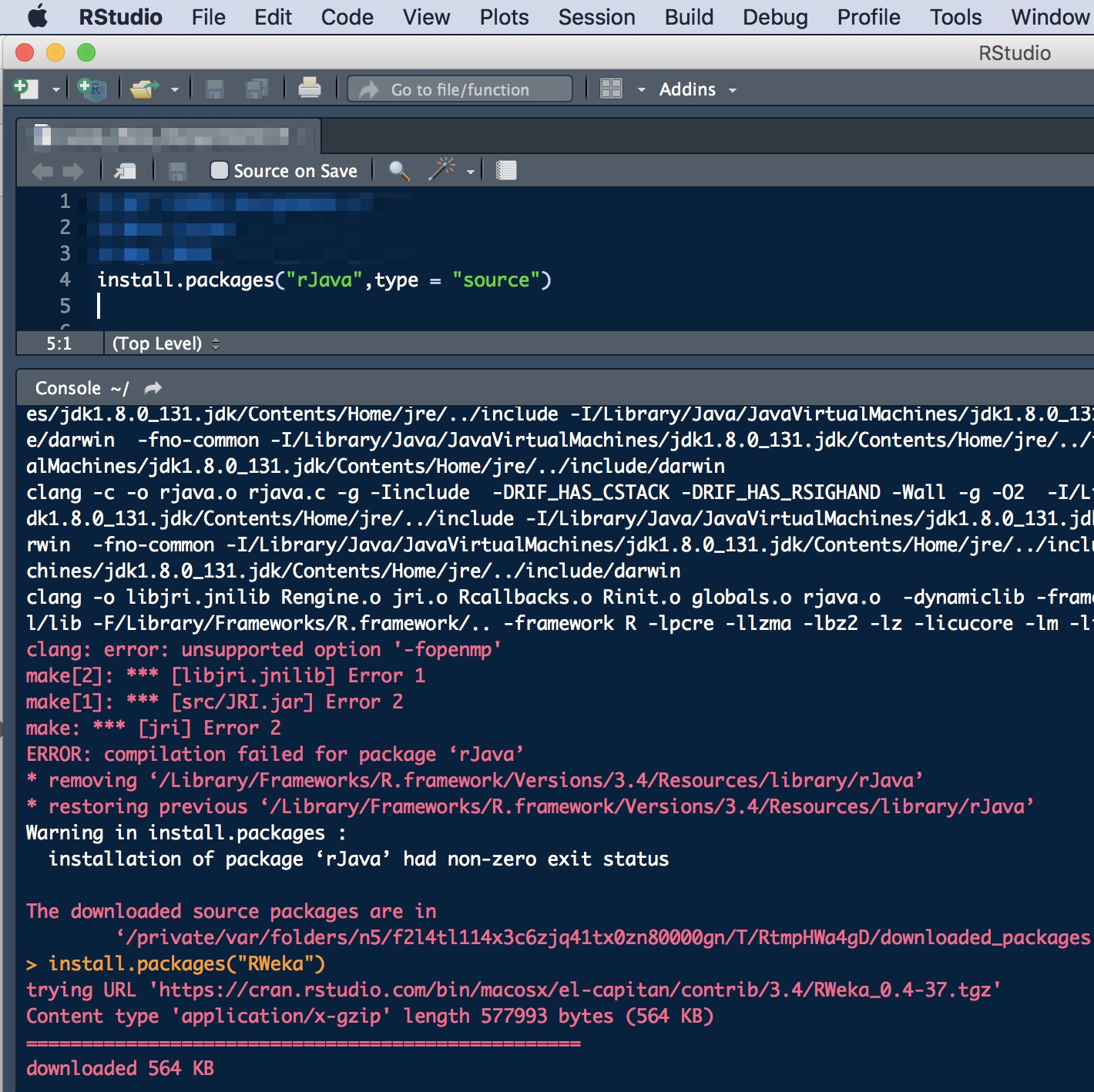
- #CANNOT INSTALL RJAVA IN R UPDATE#
- #CANNOT INSTALL RJAVA IN R UPGRADE#
- #CANNOT INSTALL RJAVA IN R FULL#
- #CANNOT INSTALL RJAVA IN R DOWNLOAD#
On unix systems make sure that R was configured with Java support. Some of the highlights are memory profiler, intelligent class loader, easy Java package integration and callback support.įirst, make sure you have JDK 1.4 or higher installed (some platforms require hgher version see R Wiki).


It is under heavy construction right now with many new features, so feel free to test-drive it if you want to be on the bleeding edge (it is a bit chatty as some debugging output is still enabled).
#CANNOT INSTALL RJAVA IN R DOWNLOAD#
The current development version is rJava 0.5-0 (available from here - see SVN access and download on the left). Please read the NEWS file for details.ħ - rJava 0.4-14 (update is recommended to all users due to memory leak fixes), please use CRAN to get the latest release. jpackage), support for custom convertors and call-backs. It sports a new custom class loader, much improved (and faster) field support, integration of all native Java types, automatic fall-back to static methods, infrastructure for writing Java packages easily (see.

#CANNOT INSTALL RJAVA IN R UPDATE#
This is a major update featuring many new features and bugfixes. See ?.jcache in R (or the online help) for details.Ģ - rJava 0.5-0 released. Adds support for Java serialization and R-side cache which enables Java objects to become persistent across sessions. Recommended update (includes bugfixes to fields handling, new support for with(), method/field auto-completion and more forgiving $ operator), includes JRI 0.5-0.Ģ - rJava 0.6-0 released. Many new features mostly thanks to Romain Francois - check the NEWS file for details.Ģ - rJava 0.7-0 released.
#CANNOT INSTALL RJAVA IN R FULL#
For the full list of fixes and changes see NEWS.ħ - rJava 0.8-0 released. We have had rJava 0.9-0 in RC state for a long time so hopefully all developers relying on rJava have checked their packages.
#CANNOT INSTALL RJAVA IN R UPGRADE#
This is a major upgrade that changes behavior of array references in low-level calls back to early 0.8 state as intedended by the original design. Also includes some minor bug-fixes.Ģ - rJava 0.9-0 released. Invalid JAVA_HOME settings are now reported. Strongly recommended for macOS users, required for Catalina. Minor fixes and increase default stack size.ģ - rJava 0.9-12 released. Mostly fixes in JRI compilations.Ħ - rJava 0.9-13 released. R packages using Java are encouraged to use this new facility to avoid class clashes with other Java packages.Ĥ - rJava 0.9-14 released. This is a major new release, the main feature is the introduction of custom class loaders for R package authors. This release improves string handling between R and Java for characters outside of the Unicode BMP.Ģ - rJava 1.0-1 released. jfields() when used on class objects (also indirectly in J() API).ĥ - rJava 1.0-2 released. This release fixes a possible segafult in. This update is only important to JDK-17 users and make sure you read NEWS file as some existing packages may no longer work with JDK-17 due to some major changes.ĩ - rJava 1.0-4 released. RJava source repository is now on GitHub and that is also the place to report bugs. Please report any bugs or wishes related to rJava or JRI using Issues on GitHub.

JRI is now shipped as a part of the rJava package, although it still can be used as a separate entity (especially for development).Ĭurrently rJava is used as a part of JGR, iPlots and JavaGD software/packages. In a sense the inverse of rJava is JRI (Java/R Interface) which provides the opposite direction - calling R from Java. The current development version can be downloaded from the files section. RJava release versions can be obtained from CRAN - usually install.packages("rJava") in R will do the trick. It allows to create objects, call methods and access fields of Java objects from R. rJava provides a low-level bridge between R and Java (via JNI).


 0 kommentar(er)
0 kommentar(er)
